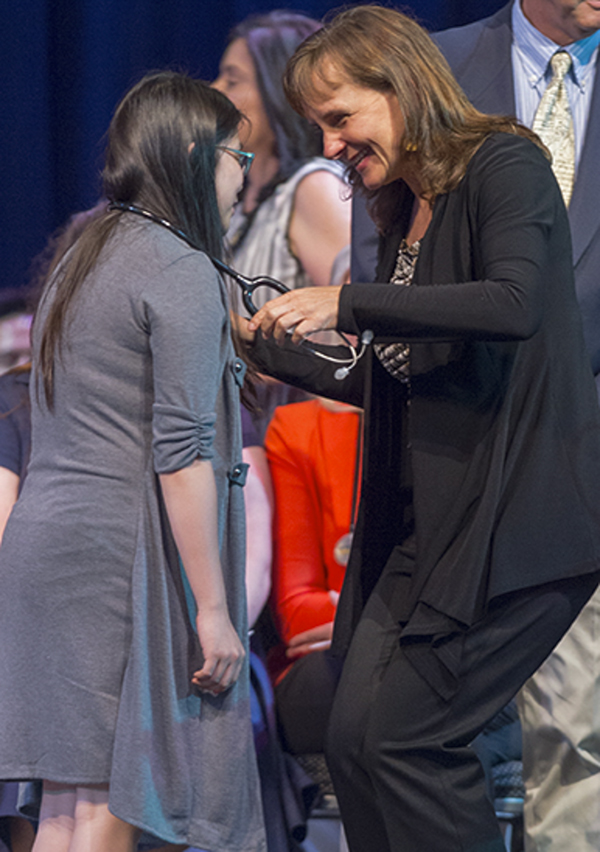Meet Sharon Demeter
Nurse leader charts new territory, develops relationships for new opportunities

Assistant Director for the Master’s Entry Program in Nursing Sharon Demeter recognizes incoming nursing students at the 2017 Welcoming Ceremony with gifts of their first stethoscopes.
After practicing as a psychotherapist for more than a decade, Sharon Demeter opted to change course and become a certified nurse midwife. So she left her Canadian roots and entered the Master’s Entry Nursing Program at UCSF. Now she lends her 15 years of clinical nursing experience and serves as the assistant director of the Master’s Entry Program in Nursing at the Betty Irene Moore School of Nursing at UC Davis.
“I wanted to work here after I heard Founding Dean Heather Young paint her vision for this school,” Demeter said. “School of Nursing leaders were so thoughtful about every aspect of the curriculum. They believed they could make a positive change in health care and were willing to put in the effort to do it.”
Demeter is a nurse practitioner and certified nurse midwife who teaches future nurses the clinical maternity course, a role with which she’s familiar. She taught at UCSF as well as Samuel Merritt University’s Sacramento campus. However, it’s her expertise in best practices in clinical placements where she has the greatest impact on the future of the program. Demeter manages the logistics of sites where students in the accelerated nursing program will fulfill clinical rotations, from identifying and securing locations to hiring and mentoring clinical instructors.
“Helping build this program is challenging because it’s new,” said Demeter, who was the first generation in her family to graduate from college. “But I love the opportunity to shape something new and different, rather than feeling potentially constricted by the way it was done in the past. Plus, the UC Davis reputation really opens doors.” As master’s-entry class sizes grow from 24 to 48 students in the coming years, clinical sites will increase to more than 25, including a level one trauma center, retirement communities, Nevada County public health department clinics and the Sacramento Food Bank and Family Services.
“We have an awareness and dedication to more community involvement with our students and sites,” Demeter said. “We are training nurses to meet the full-spectrum of need rather than simply preparing them for inpatient settings.” In 2010, more than 80 percent of new nurses moved into hospital positions after graduation. That number has decreased to less than 60 percent with a heightened emphasis on primary, transitional and community-focused care.
“We need to provide clinical experiences where nurses aren’t typically practicing. We need to move nurses into the places where health happens for people and increasingly that is outside of a hospital”, said Elizabeth Rice, associate dean for clinical education and practice. “Sharon’s approach is exactly what our program needs to prepare our students for all the opportunities that await them upon graduation.”
While entry-level nursing students focus on learning nursing and critical-thinking skills, Demeter focuses on building a program and relationships.
“If we can stay ahead of the curve and maintain our effort and enthusiasm for this reimagined nursing program, then a master’s-entry education from the Betty Irene Moore School of Nursing will have deeper meaning and significance for the graduates and the people they serve in the future.”





